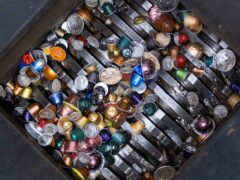Recycling secondary raw materials from waste is generally a complex as well as energy- and cost-intensive process. The Upper Austrian greentech start-up Seccon has recently developed an innovative process to extract high-quality raw materials from waste in a CO2-neutral way with virtually no loss of quality. Plus, it makes use of waste heat from existing industrial plants. The patented process is based on a thermochemical process in which organic impurities in the input material are separated out by incineration or pyrolysis. Purified, recyclable mineral or metallic raw materials are recovered in this way. In order to achieve the high temperatures required for the process, hot exhaust gases from an upstream industrial process – such as a cement plant – are to be used in future. This makes the new process particularly energy-efficient and CO2-neutral.
Trial operation with scientific support
Seccon’s first “small-scale demonstrator” was installed at the Pettenbach technical centre in Upper Austria at the end of 2023. As part of the NEFI project “TCP-to-Industry”1, the process is being studied in trial operation with scientific support from the Montanunivertität Leoben. Among other things, coffee capsules are being recycled in the test facility to recover aluminium and biofertiliser. Other input materials can also be examined here on an industrial scale as the new technology makes it possible to purify and reprocess many different materials (from composites and plastics to sewage sludge or aluminium cans, etc.) in one and the same unit. The project incorporates an investigation of the process itself as well as its combination with an industrial operation, i.e. the supply of waste heat from upstream production. Another goal is to analyse whether the pyrolysis gas produced in the recycling process can subsequently be used in the industrial production process in order to save primary energy.
Working towards a large-scale plant at a cement works
Based on the experience gained from the trial operation, the project team will develop an integration concept for a “large-scale demonstrator”. The plan is to realise a large-scale plant at a cement works as a follow-up project. Economic aspects of the concept are also being analysed. The innovative Seccon process offers economic benefits for the operators of industrial plants as well. It saves costs, consumes virtually no additional energy and offers the opportunity for further diversification and safeguarding of existing industrial sites. The new technology has great potential for widespread implementation because waste is generated everywhere and the waste heat from many industrial processes still remains unutilised.
Focal points of the TCP-to-Industry project
> Characterisation of the input and output material fractions
> Concept for the integration of the small-scale demonstrator (SSD) into an industrial plant
> Operation and measurement of the SSD in an industrial plant
> Evaluation and improvement of the energy models
> Integration of industrial waste heat
> Integration concept for the large-scale demonstrator (KPC project)
> Quantification of multiplier effects and techno-economic analyses
> Analysis of the macroeconomic effect in Austria
www.nefi.at/en/project/tcp_to_industry
1 Project partners: Montanuniversität Leoben / Chair of Energy Network Technology (project management), OÖ Energiesparverband, Seccon GmbH, WSA – waste service GmbH
The project is part of the NEFI (New Energy for Industry) model region, which is promoting the decarbonisation of industrial companies driven by innovation and technology development.
www.nefi.at/en/

